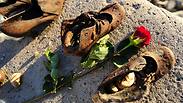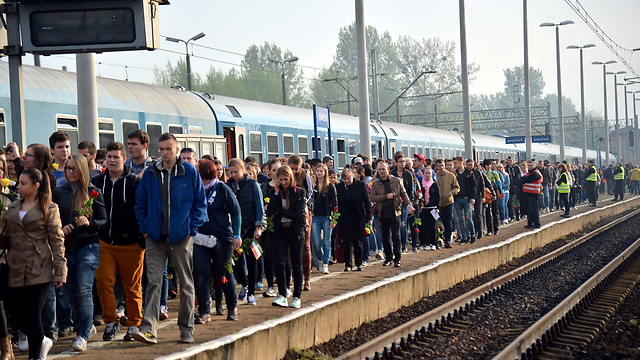
Julia Kadar, who organized a commemorative meeting in Budapest, was among those who spoke via Skype with Lt. Frank Towers, who was in Nashville, Tennessee. He had been the liaison officer of the 30th Infantry Division which liberated the train near the German village of Farsleben on April 13, 1945.
"We thank the heroic American soldiers for being able to live meaningful, useful lives – we are grateful for being able to grow old," said Kadar, who was 6 at the time.
About 2,500 Jewish prisoners, including 560 children, were being taken from the Bergen-Belsen camp in Germany to the Theresienstadt camp in Czechoslovakia when they were rescued.
Colleen Bell, the US ambassador to Hungary, highlighted the "indelible imprints" made over the years by those who Towers helped to freedom.
"This is my reward," Towers said. "They were nobody. They had nothing and they have risen up from the ashes and have become doctors and lawyers, engineers, all high-level professional people."

Laszlo Ungvari, seven when he was freed and who helped Towers compile a list of the Hungarian survivors, bought a cup from an American military mess kit to Sunday's remembrance, a memento found then by his grandfather in Hillersleben, the German town where those rescued from the train were initially taken.
The metallic cup, which had belonged to a US soldier from Nebraska, was etched with the names of the locations where the soldier had been, including London and Holland.
"The names and places on the cup are like a historical exhibit," said Ungvari, a retired computer expert who spent four months in the Bergen-Belsen camp. "It's been a penholder on my desk for decades."
Ungvari 's father died of typhus a few days after their rescue and his mother didn't speak about the Holocaust until a few years before her death a few years ago, though the family kept their Jewish identity.
Sunday's meeting was attended by 20 Holocaust survivors rescued from the train and dozens of their descendants and relatives. About 550,000 Hungarian Jews were killed in the Holocaust.
Today, there are an estimated 100,000 Jews in Hungary, the largest Jewish community in Central Europe, and the number of Jewish festivals, schools and synagogues is growing.
Still, many are concerned about anti-Semitism and the success of the far-right Jobbik party, which won 20% of the votes in last year's parliamentary elections and has become a serious challenger to Prime Minister Viktor Orban's Fidesz party.
"Nearly half of the Holocaust survivors here rejected being photographed" during the meeting, said Kadar, a retired psychologist and university professor. "They are afraid ... and were worried about appearing in front of a camera."















